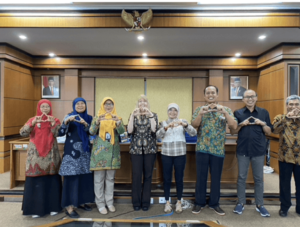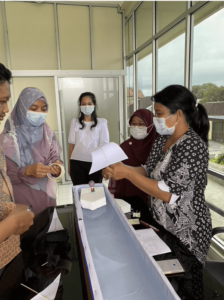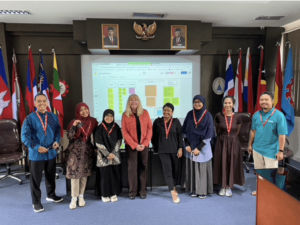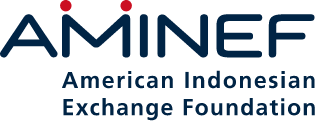Dr. Sharon Locke is a Fulbright Specialist at SEAMEO QITEP Regional Centre for Mathematics (SEAQiM) in Yogyakarta from February 5 to 17, 2023.

The leadership team for the BBGP DI Yogyakarta workshop for teachers on STEM Best Practices. The triangle is the symbol for SEAQiM.
From February 6 to 17, 2023, Fulbright Specialist Dr. Sharon Locke, professor, and director of the Center for STEM Research, Education, and Outreach at Southern Illinois University Edwardsville, and SEAMEO QITEP Regional Centre for Mathematics (SEAQiM) successfully carried out a short-term project on Developing STEM and Computational Thinking Learning Materials for Lower Secondary School Mathematics.
SEAQiM’s mission is to train and support teachers of mathematics to successfully implement the Indonesian math curriculum and to promote teaching mathematics using a STEM approach, which integrates science, technology, engineering, and mathematics to solve real-world problems. The primary project goal was for Dr. Locke to work with the host institution to collaboratively review new learning materials to ensure that the format and approach use best practices for STEM integration and include a computational thinking component.

Reviewing a SEAQiM STEM learning materials activity on wind-powered boats.
The project contributed to enhancing STEM teaching approaches in Indonesia. STEM learning and teaching are valuable because it helps prepare students to be strong critical thinkers, work successfully in teams, and apply science, engineering, and math to solve challenges such as the need for clean water and renewable resources. Although STEM education has rapidly expanded across the globe, many teachers still need training on how to effectively teach using an integrated approach.
“Working with SEAQiM, I was able to interact directly with teachers as well as collaborate with the host institution staff to design effective STEM learning activities,” Dr. Locke said.
“I participated in several activities that increased my understanding of the Indonesian educational system,” she added.
Over several days Dr. Locke worked with two different groups of teachers who were preparing journal articles on STEM education as part of their professional responsibilities. This differs from the US, where teachers are encouraged but not required to publish articles about their teaching.
“Reviewing and discussing the teachers’ works in progress showed me the innovative teaching that takes place in Indonesian classrooms. The teachers made progress on their articles and gained new skills for publishing their work in the future,” she said.
During her visit, Dr. Locke had the opportunity to lead a hands-on STEM learning session called “STEM-A-Thon” in a local community center for a group of 18 preschool and elementary-age children. The children answered her questions about what they knew about robots and then used Cubelet robots, designed for children, to practice coding. The community leader who helps run the program spoke with her about the value of introducing STEM education in community settings as a complement to school learning.

Participants in the STEM Village “STEM-A-Thon” on Feb 10, 2023.
Throughout the two weeks, Dr. Locke worked alongside SEAQiM staff as they developed a grant proposal to fund enhancements to their programs.

The SEAQiM Specialist team and Dr. Locke are working on the grant proposal logic model (on the screen behind).
“We discussed the need for a better understanding of mathematical thinking abilities across Southeast Asia, including cross-country comparisons to identify where and how teachers need to be supported to improve students’ mathematical thinking,” she asserted.
Using her experience with grants in the US, she is continuing to support the SEAQiM team to submit the proposal this coming spring.
This Fulbright project showed that Indonesia and the US share some common challenges in STEM education and that we will benefit from working together.
“Both countries have recognized a need to prepare teachers better to use an integrated STEM approach. The US has developed models that can be adapted to an Indonesian context, but US educators also can learn from ongoing work in Indonesia. For example, SEAQiM has expertise in using culture and history as a context for teaching STEM, which is an excellent way to increase student interest and motivation,” Dr. Locke further stated.
Dr. Locke will continue to work with SEAQiM by providing additional workshops for teachers through Zoom and joining the editorial board for their journal “Southeastern Asian Mathematics Education Journal.”
“Spending time in Indonesia with support from the Fulbright program enabled me to form closer relationships with my Indonesian colleagues so that we can better work toward our shared goal to improve math and STEM education,” she said.
“I will always be grateful for the Fulbright Specialist experience and encourage others to form collaborations with scholars in the dynamic academic environment of Indonesia’s diverse and beautiful country,” she further said.
Last Updated: Mar 30, 2024 @ 9:17 pm







